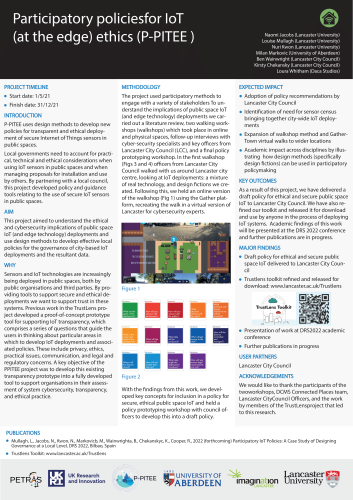Participatory Policies for IoT (at the Edge) Ethics (P-PITEE)
P-PITEE uses design methods to develop new policies for transparent and ethical deployment of secure Internet of Things sensors in public spaces.
Local governments need to account for practical, technical and ethical considerations when using IoT sensors in public spaces and when managing proposals for installation and use by others. By partnering with a local council, this project will allow development of policy and guidance tools relating to the use of secure IoT sensors in public spaces. This will cover collection, use and sharing of data, considerations of data transfer vs edge processing, cybersecurity questions relating to data storage and sharing, and how all these concerns can impact on privacy.
The project explores using participatory methods to engage with a variety of stakeholders including local SMEs, local residents, and community groups. The project will develop a new, robust policy for ethical use of IoT data in Lancaster, research publications on interdisciplinary topics including design for technology policy and the ethical management and cybersecurity implications of public space IoT and associated data, and a fully implemented IoT Transparency Guidelines tool which can be used by organisations who are considering IoT deployments and wish to consider the transparency aspects and ethical data use.
Project outputs
The project has launched a new interactive tool called TrustLens aiming to help organisations use technology in public spaces.
The team has been working on a wider project alongside Lancaster City Council and the University of Aberdeen to explore the ethical use of Internet of Things (IoT) sensors. TrustLens was developed as part of the Participatory Policies for IOT (at the Edge) Ethics, funded by UK Research and Innovation via PETRAS.
This information is free to download in the TrustLens website, which also encourages organisations to design, use or plan IoT technologies “through a series of questions to guide scoping, development and operation”. Resources also include guidelines for facilitators and examples that enable organisations to follow their own process.
Find more about the TrustLens toolkit here.
The P-PITEE poster displayed at the PETRAS Academic Conference | Networking Research Showcase on 16 June 2022:


